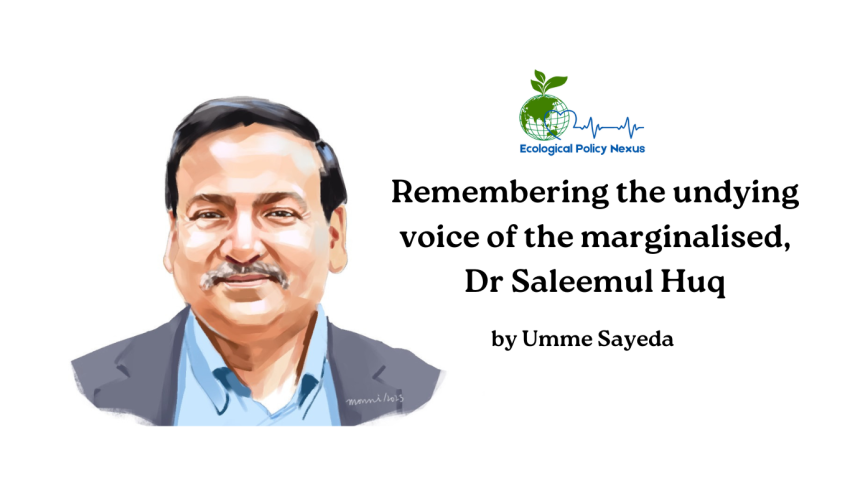For nearly 50 of his 71 years, Prof Saleemul Huq devoted his life to advancing international climate policy and justice through scholarship, activism, and mentorship, serving as a pillar of support for future generations of climate leaders. Despite knowing me only briefly, Prof Huq took a moment during our last meeting at the 2023 Regional Climate Summit to ask if I had submitted my thesis. Just one month later, on 28 October, my family and people around the world awoke to the heartbreaking news of Prof Huq’s passing due to a severe cardiac attack.
It’s rare to find anyone in climate advocacy, activism, or research who hasn’t encountered the name of Prof. Saleemul Huq, the distinguished Bangladeshi-British scientist. After his passing, many worldwide fell into silence and reflected on his contributions and cherished moments shared with him. As the Conference of Parties (COP) 28 approached, the absence of Dr Huq was profoundly felt; it was the first COP without his presence, though his voice endured through his tireless, year-long efforts.
Prof Huq was a trailblazer in the Global South’s fight against climate injustice. Born in 1952, he spent his early years across three continents – Asia, Africa, and Europe – due to his parents’ diplomatic work. In the 1970s, he moved to the United Kingdom to pursue his studies at Imperial College London, where he earned a doctorate in botany in 1978.
In the 1980s, Dr Huq returned to Bangladesh, leaving behind a well-established life abroad to serve his country and its people. His profound contributions to knowledge in climate change, environmental issues, and development extended far beyond borders, as he led and inspired emerging climate scholars and activists worldwide. He continued his legacy of scholarship, leadership, and mentorship until his last day, leaving an indelible impact across the world.
First, Dr Saleemul Huq was more than just a climate scientist and advocate. He established a legacy of knowledge production aimed at combating all forms of climate injustice while amplifying the authentic stories of marginalization, vulnerability, and resilience from the Global South. He understood the importance and was very instrumental in his effort to bridge the gap between natural and social sciences. So he sought interdisciplinary solutions to the complex and existential threats posed by climate change and environmental issues.
In 2019, Dr. Huq was recognized as one of the top twenty global influencers for his extensive body of scientific publications and his regular columns advocating for climate policy. After two years, in 2022, he was awarded the Order of the British Empire (OBE) in the New Year Honors, and Nature recognized him as one of the top ten influential figures in the climate change arena, both accolades reflecting his unwavering activism and impact.
After returning to Bangladesh, Dr. Huq co-founded the Bangladesh Centre for Advanced Studies (BCAS) with Dr. Atiq Rahman. Together, they successfully urged the then Government of Bangladesh to establish a separate Ministry of Environment, with BCAS serving as a special research arm for this newly formed ministry.
Third, Dr. Saleemul Huq was a humble and compassionate advocate for climate justice. His warmth touched everyone he encountered. He left each person and place better for having known him, and people around the world bear witness to his generosity. Erin Roberts, a climate policy researcher and a mentee of Dr. Huq for over a decade, expressed how he offered mentorship and support with remarkable humility and simplicity, even to those he had never met before.
His advocacy extended beyond negotiation rooms, and his teaching went far beyond traditional classrooms. Dr. Huq taught at several institutions, including Imperial College London, the University of Dhaka, the United Nations University, and the Independent University Bangladesh. He mentored countless learners and leaders across three generations globally.
Dr. Huq recognized that few climate and environmental scientists in Europe, and only a handful in Asia and Africa, truly understood the realities of the escalating climate crisis, especially its impact on the Global South. As a result, he encouraged Bangladeshi youth to pursue studies in the Global North countries and return home equipped with the training needed to develop authentic climate expertise grounded in the local realities.
Dr. Huq firmly believed in the power of youth leadership to combat climate injustice and remained hopeful throughout his advocacy journey. In every virtual and in-person event, he seized the opportunity to inspire young people to take action and lead with knowledge. He transformed the ICCCAD into a hub for youth researchers and activists from Bangladesh and beyond. As a true steward of climate justice, he inspired both this generation’s and previous generation’s youth and scholars with his wise words and humble efforts. Today, these new stewards continue to carry forward his legacy across the globe.
In conclusion, the world has lost a steadfast advocate for climate justice, and the people of the Global South, who have historically endured severe climate injustices and environmental exploitation, have lost their most active and influential voice. Dr. Saleemul Huq’s absence has left a significant void among his thousands of colleagues, fellows, mentees, and loved ones – none can compare to his unique impact.

